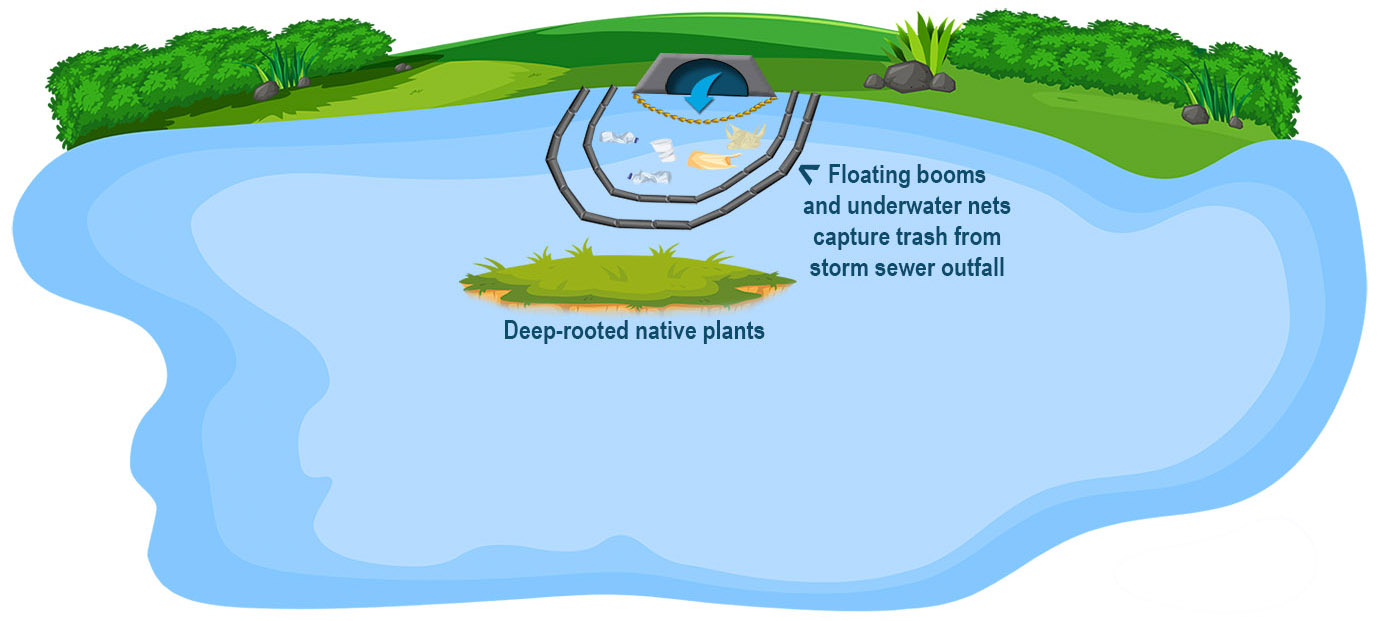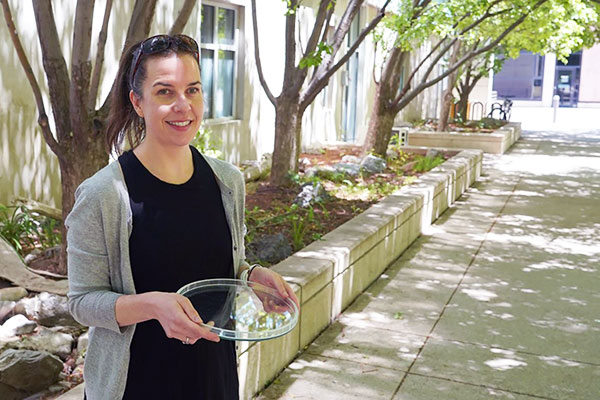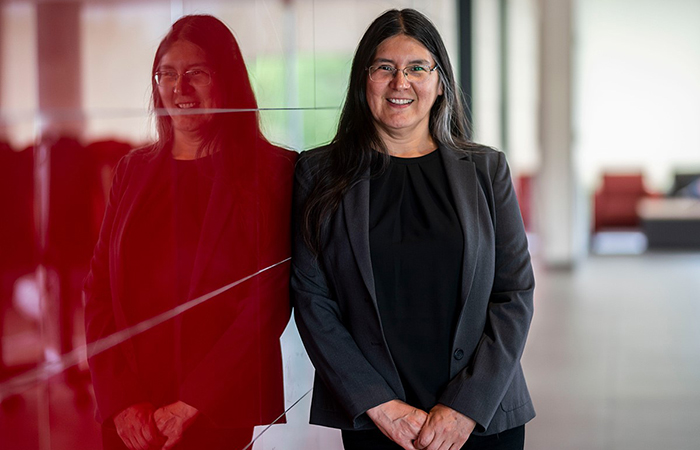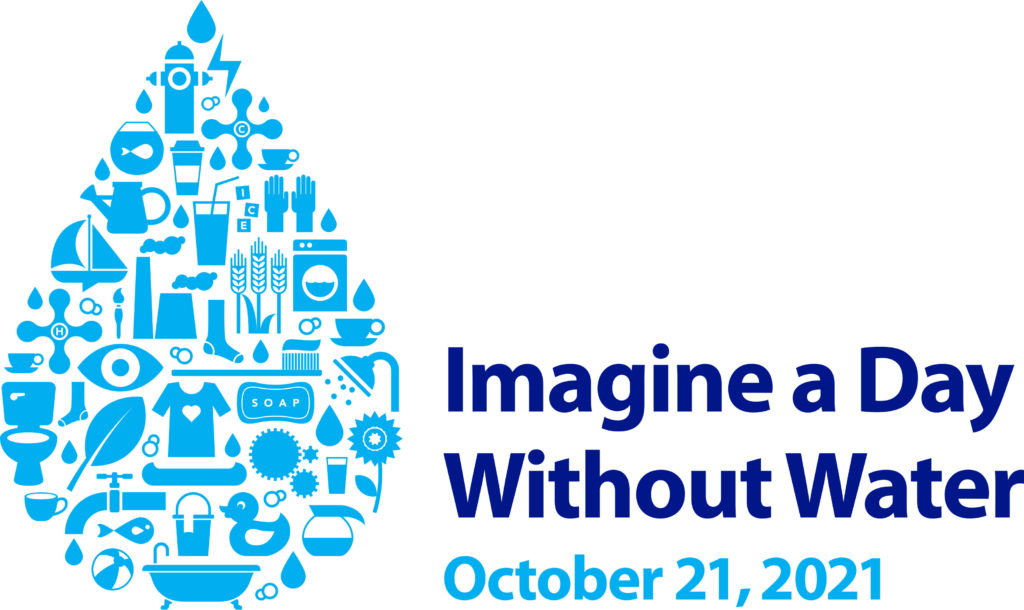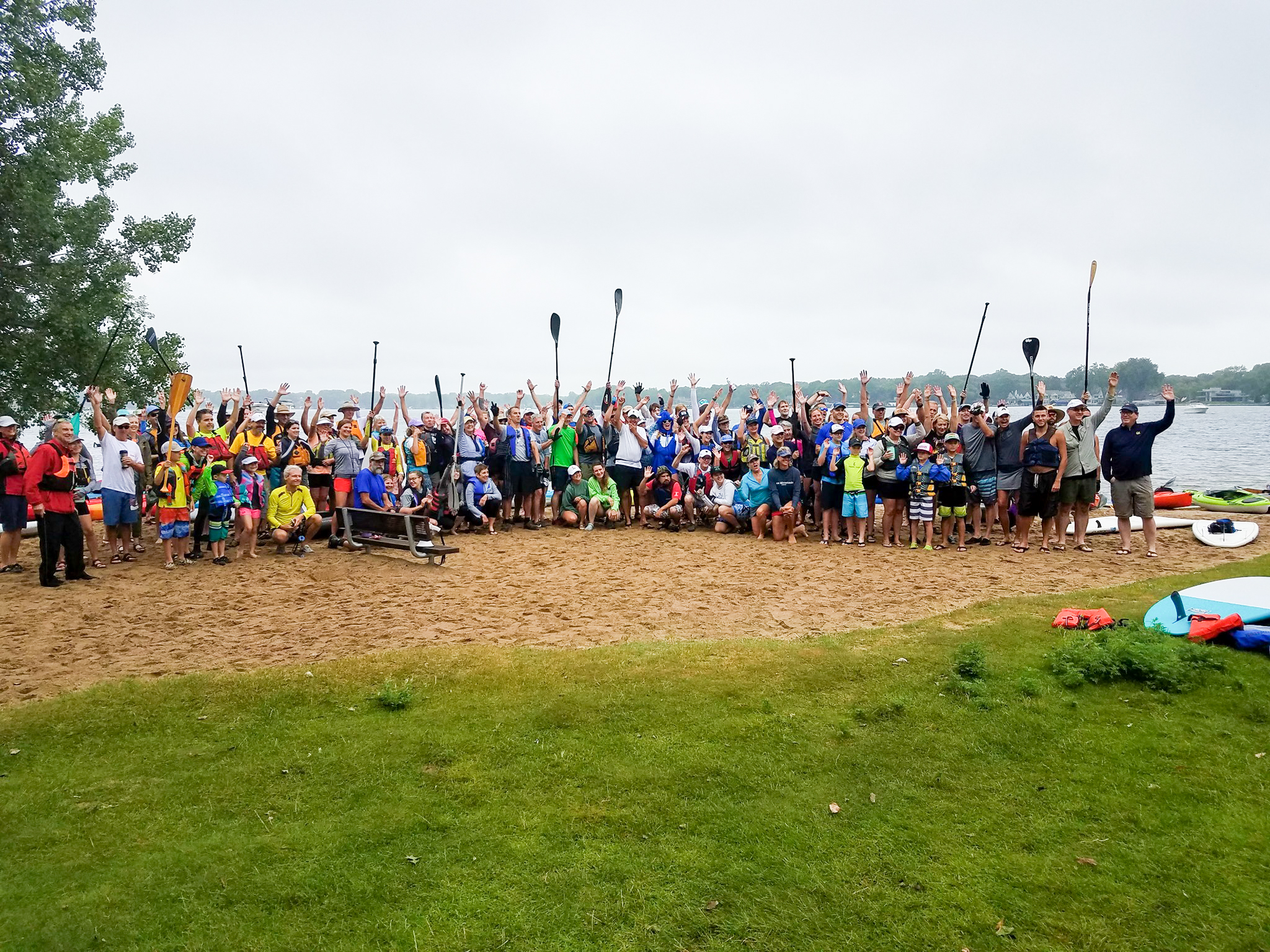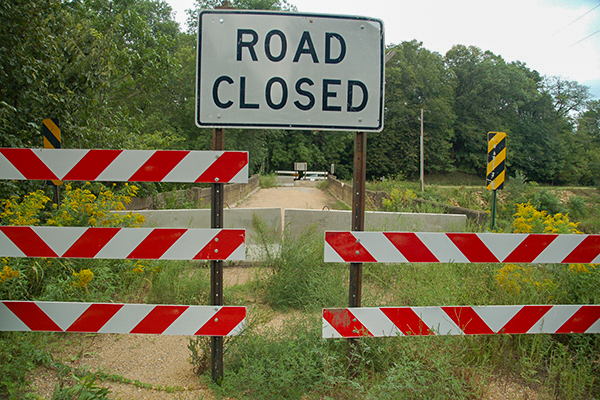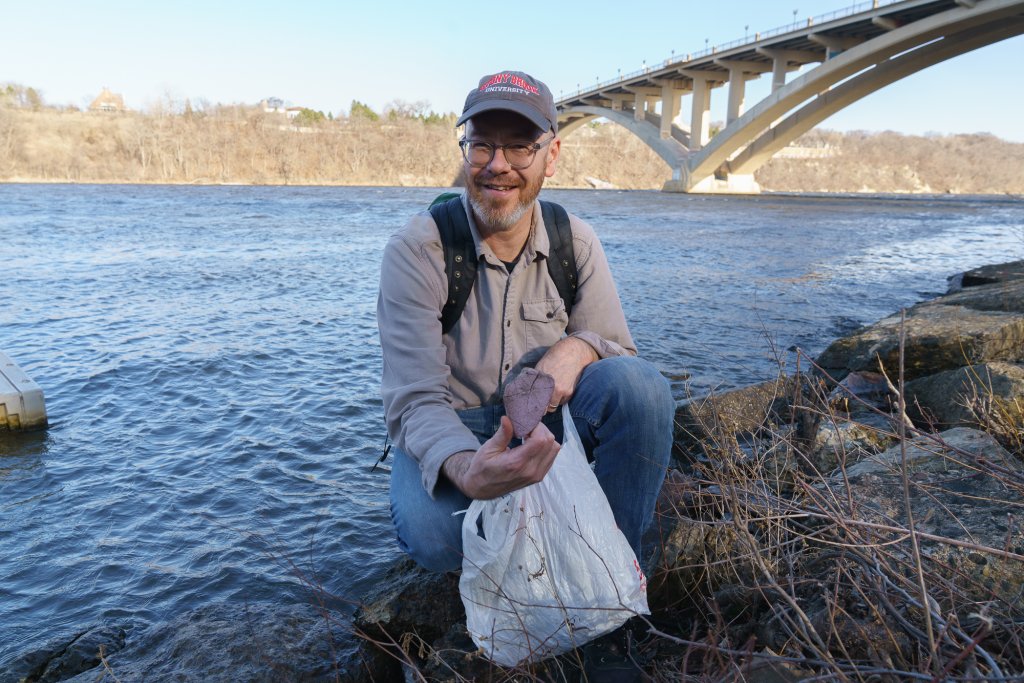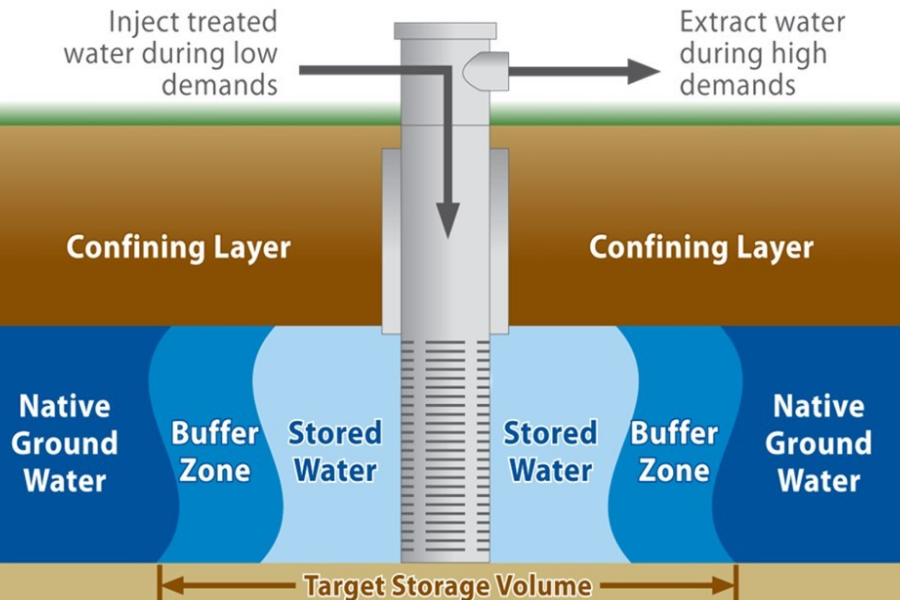Groundwater governance project enters next phase with focus on tribal engagement, intergovernmental collaboration
August 3, 2023
Saint Paul, MN – Freshwater has begun a second phase of work to build capacity for groundwater governance in the Great Lakes region funded by the Joyce Foundation. The team will be following recommendations summarized in the report, Groundwater Governance, Well Cobbled?, which assessed the technical, legal and structural capacity of the six Great Lakes states and 35 federally recognized tribes in EPA Region 5. The goal of the first phase documented the existing policies and practices affecting groundwater that feeds our lakes, rivers, wetlands and drinking water – and serves as a baseline to frame future groundwater policy work.
"One of our findings was that groundwater knowledge and policy varied significantly across the region and that policies that address cross-boundary challenges to groundwater use are non-existent,” explained Carrie Jennings, Freshwater research and policy director. "So, we are designing this next phase of work to focus on areas where aquifers span political jurisdictions and bringing together the people that share that water to help identify the current challenges and brainstorm strategies to address them."
"Through our previous research, we know there are partners in various levels of government who are interested and willing to bring groundwater sustainability and conservation principles into their policy and practice, but they may not have had the reason or ability to do so yet."
The partners in this research and policy collaborative include organizations from the first phase of work (Freshwater, University of Minnesota, Water365, Great Lakes Indian Fish & Wildlife Commission), along with a new partner, the Chicago Metropolitan Agency for Planning.
This project will help build a groundwater governance system that fosters inclusive prosperity and ecological health, and repairs past harm, while being resilient to climate and population stresses over the next generation.
Work plans include:
- Hosting three "Aquifer Action Cluster" workshops that are centered on a particular shared aquifer to share issues and strategies and elevate tribal perspectives.
- Providing aquifer-scale technical information and local ordinance review to identify best practices and strengthen tribal participation in environmental policy processes.
- Developing insight through cross-regional comparison of best practices.
- Modeling groundwater principles.
- Developing specific policy language to facilitate improved intergovernmental collaboration.
Additionally, the team will participate in an existing groundwater governance planning process in the Chicago metropolitan area.
Freshwater hires tribal governance research associates
As part of this project, Freshwater recently welcomed two contract employees to work on tribal groundwater governance research and engagement, Alyssa Fabia and John Roterman. Alyssa completed her undergraduate degree in Anthropology at Hamline University and developed a keen interest in organizational structures, labor force movements, and the power of recognized authority. She completed a Master of Development Practice at the University of Minnesota.
John is a citizen of the Fund du Lac reservation and an enrolled member of the Minnesota Chippewa Tribe. He is entering the final year of a master’s degree in Tribal Resource and Environmental Stewardship at the University of Minnesota-Duluth.
"Alyssa and John will be meeting with our workshop hosts at Lac du Flambeau in Wisconsin and Pokagon Band of Potawatomi in Michigan, helping to form a local organizing committee, and following up on invitations to participants so that we can elevate the tribal perspective on groundwater," said Eileen J. Kirby, Freshwater research and policy coordinator.
Continuing partnership with the Joyce Foundation
This latest grant of $500,000 from the Joyce Foundation is critical in helping advance groundwater governance in the Great Lakes region. Founded in 1948, the Foundation supports evidence-informed policy solutions for a wide range of social and environmental issues.
Joyce Foundation Environment Program Co-Director Elizabeth Cisar was recently recognized by Crain’s Chicago Business in their Notable Leaders in Sustainability.
"We love working under the guidance of Elizabeth Cisar," said Jennings. "Groundwater policy is a new funding area for the Joyce Foundation, and they anticipate a long-term commitment, so building a solid foundation of knowledge along with respectful relationships with states and tribes in the region is critical. Elizabeth is engaged and focused on providing the contacts and resources that our team needs to be successful."
The initial Phase 1 study showed that groundwater governance in the Great Lakes Region is in different stages of development and in need of better alignment to thoughtfully and sustainably manage aquifers and groundwater-surface water connections. In addition, there is an important need to amplify tribal government perspectives and advance indigenous leadership in groundwater governance. While priorities vary among tribal governments, many have strong interests in ecological preservation and restoration that intersect with groundwater management issues.
This continued work is intended to provide governing agencies, elected officials and other decision makers with defined strategies on how to equitably and sustainably manage groundwater over the long term.
Great Lakes Protection Fund project brings together land trusts, watershed scientists and marketers to improve water quality
Freshwater and partners to develop cause marketing solution to agricultural runoff
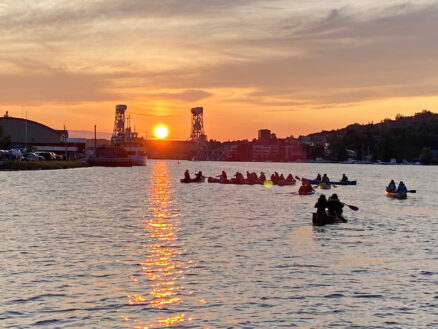
May 25, 2023
Saint Paul, MN – Freshwater has been awarded $1.5 million from the Great Lakes Protection Fund for a 5-year effort to improve water quality in the Maumee, St. Louis and Saginaw River watersheds, tributaries to the most impaired areas of the Great Lakes.
The project team will use cause marketing to raise funds for permanently converting marginal cropland to perennial vegetation, thereby enhancing carbon storage and curbing nutrient runoff.
According to Carrie Jennings, Freshwater research and policy director who is leading the project, “There are many geologic, economic and societal commonalities across the Great Lakes states that allow us to expand the geographic reach of our efforts to improve water quality. We are grateful for the support and guidance of the Great Lakes Protection Fund, the enthusiasm of our new land trust partners, and the fiscal-management help of The Conservation Fund, Great Lakes Office.”
Permanent solutions on carefully selected croplands
Working with local land trusts and watershed modeling experts, the team will identify landowners in key locations and prioritize croplands that would provide the greatest water quality benefits. This science-based approach will be used to carefully select parcels, helping the land trusts build capacity and expertise in the process.
The team will develop a modeling framework to target areas with the highest potential for phosphorous loading, along with the lowest predicted land value, in order to maximize the overall return on investment and make sure funds are put to good use.
In contrast to other programs that rely on landowners to voluntarily install best practices, this approach provides a permanent solution that benefits water quality, soil health and wildlife habitat. Even Conservation Reserve Program (CRP) contracts, which pay farmers to take acres out of production, are not permanent – and the number of enrolled acres can fluctuate significantly from year to year.
Cause marketing for conservation
To fund land acquisitions and conservation easements, the project will include a cause marketing campaign led by the Bolin-Zwieg Agency. The goal will be to partner with several large brands that can engage consumers in point-of-sale donations and other promotions.
By building a memorable and engaging brand around this project, the team is confident that consumers will support Great Lakes water quality efforts through their donations.
“Conservation funding is complex, competitive, and always evolving,” said Zachary Branigan, executive director of the Saginaw Basin Land Conservancy. “We are grateful for the opportunity to help develop a new way to generate dollars for land protection, directly from customers who make market choices to do so. We believe that cause marketing will be a strong asset to the land trust community and can empower our organization to take on critical conservation projects.”
Michelle Stockness named Freshwater executive director
May 17, 2023
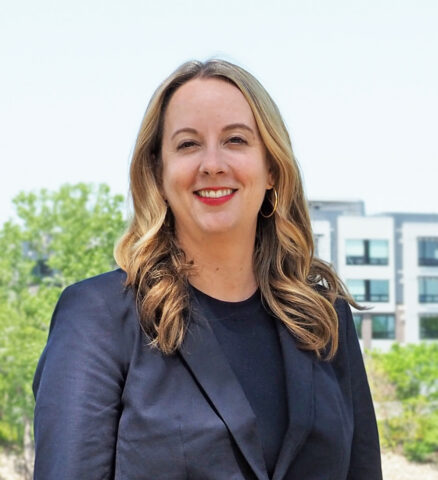 Saint Paul, MN – Michelle Stockness, who has 20 years of local, regional and national leadership experience solving complex problems in water quality and water supply, will be Freshwater’s next executive director.
Saint Paul, MN – Michelle Stockness, who has 20 years of local, regional and national leadership experience solving complex problems in water quality and water supply, will be Freshwater’s next executive director.
Throughout her career, she has demonstrated an ability to build strong relationships across many jurisdictions, bringing people together to drive positive change in addressing Minnesota’s most difficult water problems.
"Michelle has earned respect as a trusted leader in the water community and will be an exceptional executive director for our organization, accelerating our mission," says Ryan Godfrey, Chair of the Freshwater board of directors. “Our staff and board members at Freshwater welcome Michelle, and we are thrilled to work with her in raising the organization’s reach and impact on protecting water across Minnesota and beyond.”
She was most recently a vice president at Barr Engineering, one of Minnesota’s premier environmental and engineering consulting firms, where she guided public and private clients through regulatory and environmental water issues across sectors including drinking water, wastewater and stormwater. Her work included managing groundwater contamination by PFAS, water supply, water reuse and sustainable design.
As a civil engineer, Michelle has a deep understanding of water systems, and leads cross-sector initiatives including the Minnesota Infrastructure Alliance and the Minnesota Water Workforce pilot. At Freshwater, she will continue to help raise public awareness and develop policies for sustainable infrastructure and workforce solutions.
In addition to her work for private corporations and governments, she is a member and past board chair for Environmental Initiative, a Minnesota nonprofit that drives collaboration for environmental solutions and environmental justice. Now she will bring that nonprofit leadership experience to advance Freshwater’s mission of science-based, collaborative problem solving.
Her role in national professional organizations will also extend Freshwater’s reach in community engagement, education, research and policy. Michelle is board vice president of the American Water Works Association (AWWA), a world-wide professional organization dedicated to safe drinking water. And as a champion of equity, diversity and inclusion, she is head of the Minnesota AWWA’s DEI committee.
“I’m beyond excited to join the Freshwater team, and I look forward to talking with people across Minnesota about their ideas of what we can accomplish together!” said Michelle.
She will take over as executive director on May 30, a few weeks before Freshwater’s annual Water Connects Us event that will be held this year at Harriet Island in Saint Paul on June 22. There is no cost to attend, and all are welcome to come see what Freshwater is up to and say hello to Michelle.
Michelle lives in Minneapolis with her husband and three daughters.
Boom filters to keep trash out of Lake Hiawatha
May 3, 2023
Minneapolis, MN — Freshwater and partners are planning an event on Saturday, June 3, to unveil a new litter capture device being installed in Lake Hiawatha, long known for excessive trash accumulation. The new device will capture trash from a large stormwater outfall that drains over 900 acres of South Minneapolis.The day includes a volunteer clean-up, an art installation, and the chance for people to sign up for pollution prevention programs like Adopt-a-Drain and Adopt a River.
This story begins with one man’s personal vendetta against litter filling Lake Hiawatha. For Sean Connaughty – teacher, artist, and community activist – picking up trash as he walks his dog twice a day around Lake Hiawatha in South Minneapolis is a natural, reflexive response. He’s been at it for over eight years. But like cleaning a house, cleaning up litter around the lake is an action that has to be repeated over and over again, unless it can be captured upstream.
Connaughty investigated and learned that trash he and other community residents continually collect travels into the lake through a system of storm drains lacing through a huge swath of South Minneapolis. “It drains debris, trash and other pollutants from our streets coming all the way from Chicago Ave. to the west and Lake Street to the north,” he observed. “This storm drain system has no filtration or mitigation at all.”
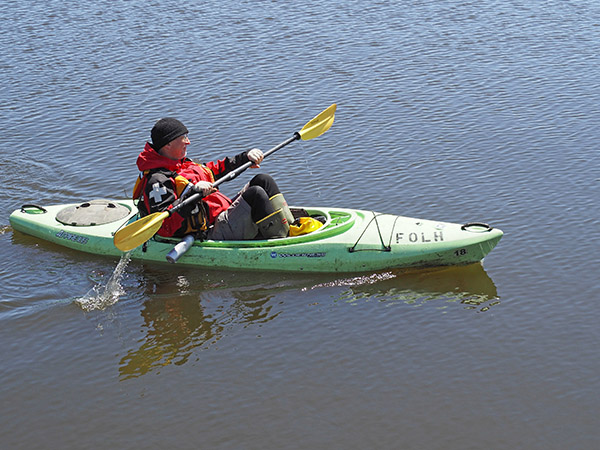
Connaughty and others in the community formed Friends of Lake Hiawatha to spread the word about this problem and pursue ways to prevent trash from entering Lake Hiawatha, Minnehaha Creek and the Mississippi River. Since 2015 this group and others have been lobbying for infrastructure to capture litter as it enters the lake, as well as an artistic native planting in the delta surrounding the storm sewer outfall.
When Freshwater was approached in October 2021 by River Network, a national network of water advocates, with the possibility of funding under a grant from the Coca Cola Foundation to install a litter capture device in the Mississippi watershed, Lake Hiawatha immediately came to mind. In collaboration with a team of people from the City of Minneapolis, the Minneapolis Park and Recreation Board, and the Friends of Lake Hiawatha, Freshwater has partnered with Osprey Initiative to create and install a litter capture system at the mouth of the large storm water outflow discharging into Lake Hiawatha.
Debris collected in this series of three booms will be sorted, recorded, and disposed of properly by a maintenance team trained by Osprey Initiative and funded by the City of Minneapolis. This collected debris data provides critical information the City can use to better understand the extent of the pollution problem, and enact further measures to diminish pollution further upstream.
The new system will be installed on Saturday, June 3. Freshwater and partners will host a celebration, with support from CenterPoint Energy, and a community-driven, large-scale cleanup around the lake to provide a clean slate for later analysis of accumulated trash. In addition to the clean-up, an artistic installation of native catchment plantings near the project site, designed by Connaughty and a team of fellow artists, will be celebrated. Attendees will also have the opportunity to sign up to help protect water in their own neighborhoods, through Adopt-a-Drain-Minnesota or Freshwater’s Adopt a River programs.
This event helps the community see storm drain pollution and offers an opportunity for tangible action. This tends to lead to further action. Connaughty’s words proved true, “One thing that's keeping me going is that I’m confident we're going to come together as a community and resolve this problem.”
One man’s mission to pick up trash along the shores of a neighborhood lake initiated a ripple effect, spurring collaborative action from the local community, city government, state and national nonprofits, and a corporate foundation. These collective efforts will reduce trash not only in Lake Hiawatha and Minnehaha Creek, but all the way downstream to the Mississippi River.
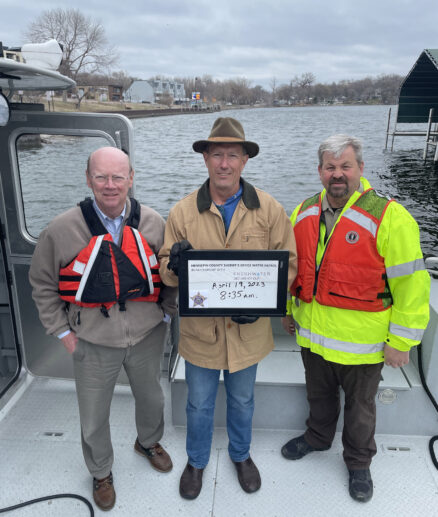
Ice-out declared on Lake Minnetonka
April 19, 2023
Spring Park, MN — On the morning of April 19, Freshwater and the Hennepin County Sheriff’s Office Water Patrol declared ice-out on Lake Minnetonka, a spring tradition for the Twin Cities’ largest lake.
Ice-out is observed on Lake Minnetonka when a boat is able to safely navigate from any shore to any other shore, through any channel, and around any island without being stopped by hard ice.
Accompanying the water patrol each year are board members or volunteers from Freshwater, whose founder Dick Gray developed a system for observing ice-out on the lake back in the 1960’s.
This year’s ice-out on Lake Minnetonka is a bit later than the median date of April 13, but well short of the latest recorded ice-out on May 5, 2018. Large areas of the lake had been open following a recent heat wave, but thick ice flows still impeded access to Gray’s Bay and other portions of the lower lake until April 19.
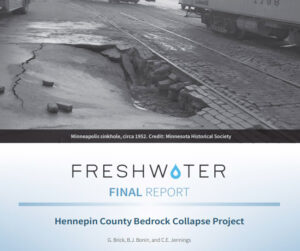 Hennepin County Bedrock Collapse Project featured on MPR
Hennepin County Bedrock Collapse Project featured on MPR
April 17, 2023
Minneapolis, MN —Minnesota Public Radio aired a story on urban sinkholes, featuring an interview with B.J. Bonin, a geologist who co-authored Freshwater's 2021 report on the subject.
Freshwater convened a team of experts to study the geological conditions that can cause sinkholes to develop in Minneapolis and surrounding areas.
Hennepin County Emergency Management will use results of this investigation to highlight risk to the public and to help stakeholders take action to mitigate that risk.
Legislature earmarks $3 million for Water Quality and Storage Program
May 18, 2022
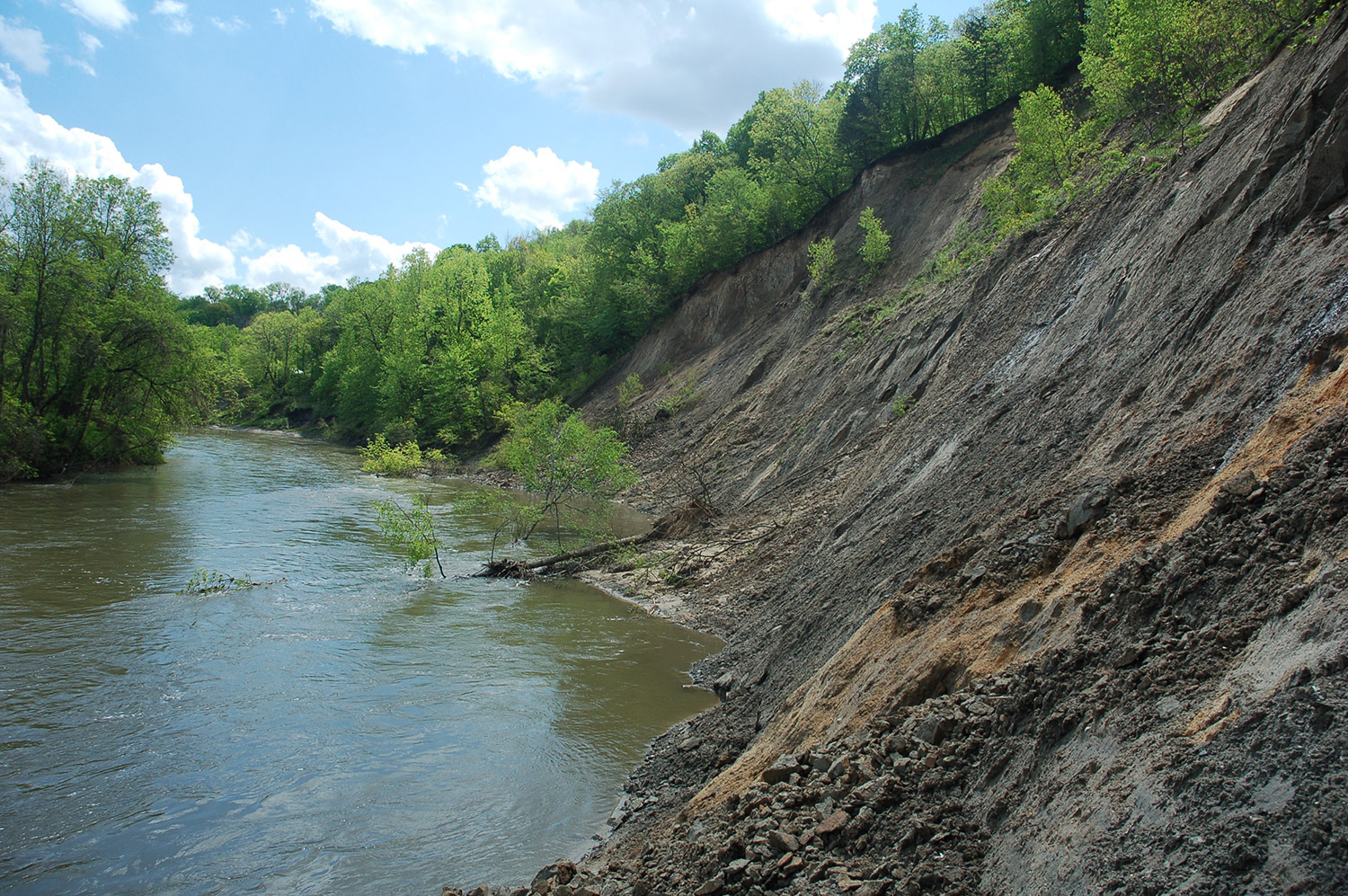
St. Paul, MN—“Freshwater has been laser focused on advocating for ongoing funding for the the newly created Water Quality and Storage Program and is pleased that the Minnesota Legislature has included $3 million in the House/Senate bonding bill,” Freshwater Research and Policy Director Carrie Jennings said.
This year Freshwater advocated for $5 million in bonding with leadership from Rep. Todd Lippert (DFL- Northfield) and Sen. Bill Weber (R-Luverne.) “We know the demand is there,” Jennings said. “The initial $2 million allocated to the Board of Water and Soil Resources (BWSR) last session will be quickly distributed this year to projects that submitted plans for holding back water on the landscape to reduce erosive flows in rivers.”
"Why is it raining plastics?" Free virtual public lecture on microplastics on April 13
Feb. 28, 2022
St. Paul, Minnesota—Freshwater and the University of Minnesota College of Biological Sciences are cohosting a free online lecture open to the public on Wednesday, April 13, from 12–1:30 pm.
The public is invited the Moos Family Speaker Series on Water Resources. This event focuses on microplastic waste.
The featured speaker is Dr. Janice Brahney, an associate professor at Utah State University who holds a doctorate in environmental biogeochemistry, a master’s degree in earth science, and a bachelor’s degree in environmental science. Her research sits at the intersection of atmosphere and earth, focusing on how the atmosphere is a pathway for materials to enter surface waters, as well as the cause, effect, and mitigation of water quality impairment.
Much of Brahney’s work has produced results with far-reaching implications for policy, land-use regulation, and ecosystem monitoring. Her research has been featured in The New York Times, The Washington Post, National Geographic, Scientific American, and NPR, and she has been a guest on several podcasts including Big Picture Science and Quirks and Quarks.
Freshwater mourns the passing of Darby Nelson
Jan. 19, 2021
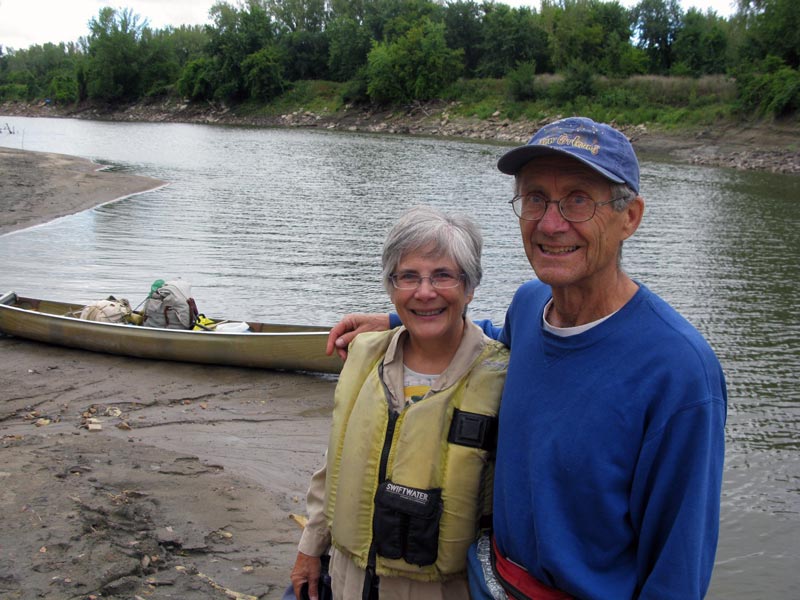
St. Paul, Minnesota—We were deeply saddened to hear of Darby Nelson's passing on Jan. 13. Darby and his life and paddling partner, Geri, have had a strong impact on Freshwater over the years. They founded our present-day internship program and share a deep passion for the health of our lakes and rivers.
Darby was a board member for a multitude of organizations including Freshwater and an incredible philanthropist. He was a teacher of biology and environmental science at Anoka Ramsey Community College for 35 years and earned the first ecology Ph.D. from the University of Minnesota in 1970. He served three terms in the Minnesota House of Representatives, passing a multitude of laws for environmental protections. He was a prolific writer, publishing two award-winning books (For Love of Lakes, and For Love of a River—The Minnesota); an avid cross-country skier; and father to two children and grandfather to five.
Thank you, Darby, for being a friend to Freshwater.
Learn more about Darby and read stories from his remarkable life here:
Freshwater member spotlight on Darby and Geri.
Darby's obituary in the Star Tribune.
Darby's website.
Free virtual lecture series on water and the environment
Oct. 25, 2021
St. Paul, Minnesota—The public is invited the Moos Family Speaker Series on Water Resources for an event of influential experts presenting the latest research on timely and important issues.
Deborah McGregor—who holds a doctorate in forestry, a master's degree in environmental studies, and a bachelor of science in psychology—will give a talk titled “Indigenous participation in Great Lakes governance: an environmental justice perspective.” McGregor’s research has focused on Indigenous knowledge systems and their various applications in diverse contexts including environmental and water governance, environmental justice, health and environment, climate change and Indigenous legal traditions. Learn more >
Freshwater participates in Imagine a Day Without Water
Oct. 20, 2021
St. Paul, MN—Tomorrow, Freshwater joins elected officials, water utilities, community leaders, educators, and businesses from across the country as part of the seventh annual Imagine a Day Without Water, a nationwide day of education and advocacy about the value of water.
Led by the Value of Water Campaign, over a thousand organizations across the country will join Imagine a Day Without Water on Oct. 21, 2021, to raise awareness about the role of water infrastructure in our lives and the importance of investment. The focus of this year’s event is to invite people to learn more about where our water comes from and where our wastewater goes. Learn more >
Eighth Annual Big Island & Back 10K is Aug. 7
July 8, 2021
St. Paul, MN—Freshwater’s eighth annual Big Island & Back! 10K Paddle will take place on Saturday, August 7, 2021 starting at 9 am. Tune up your canoe, kayak, or paddleboard and head on over to Excelsior on Saturday, Aug. 7, for a friendly race out around Big Island and back. The race will start near the swim area at Excelsior Beach Park. Freshwater’s goal is to get paddlers of all ages and skill levels out on Lake Minnetonka for a great community summer event and raise money for a couple of worthy causes. Learn more >
Water storage program included in final environment deal
June 25, 2021
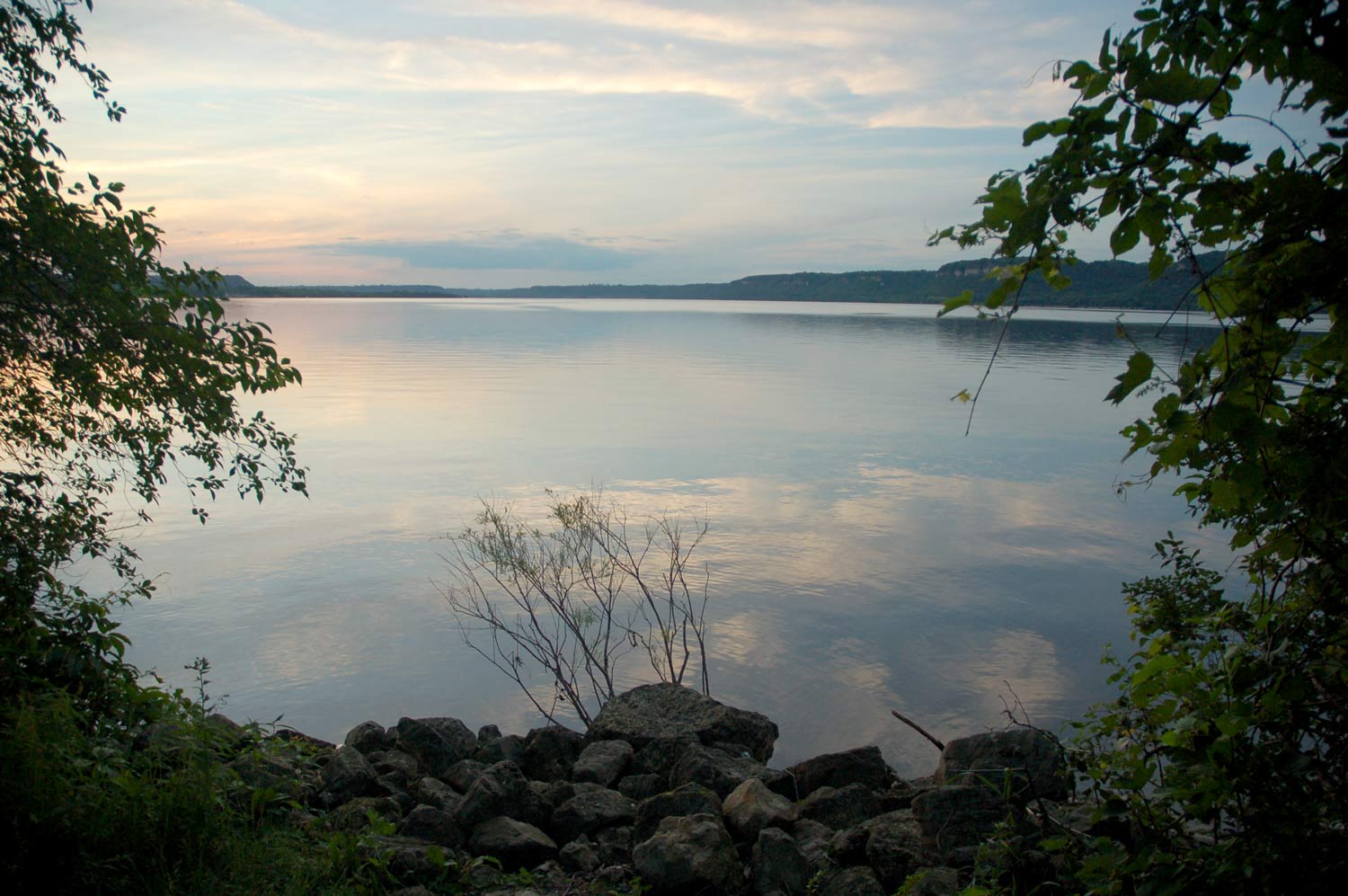
St. Paul, MN—“Freshwater’s work in St. Paul has led to bipartisan support for a state water storage program, particularly targeted to the Minnesota River Basin,” said Freshwater’s Executive Director John Linc Stine. “The work on the ground in the basin gave us the tools we needed to get this over the line at the Capitol.”
After weeks of negotiation, the Minnesota Legislature has reached an agreement on a budget and policy changes for Minnesota’s environmental agencies, as well as the 2020 and 2021 LCCMR bills. Read more
Water storage, environment policies hanging in the balance
May 7, 2021
St. Paul, MN—As the Minnesota Legislature heads into the final stretch of the 2021 legislative session, millions of dollars for environment and natural resources spending and issues that have bipartisan support hangs in the balance due to negotiations on the Environment and Natural Resources Omnibus bill. While negotiations are normal part of the legislative process, there are a significant number of differences between the House and Senate bills that threaten to derail issues that have broad support. Read more
Taking a closer look at Mississippi River plastic pollution
April 8, 2021
Local artist and MWS Art for Water participant, Presley Martin, creates art with materials found in the water and along the shores of the Mississippi River. What he learned in the Art for Water program inspired him to create a Field Guide to Plastic of the Mississippi River. Read his story.
Banking Groundwater: A Study Examining Aquifer Storage and Recovery for Groundwater Sustainability in Minnesota
March 15, 2021
Nearly 75% of Minnesotans rely on groundwater for their water supply, but that supply can become strained as population grows, land-use changes, and climate change affects precipitation and groundwater use and recharge. These factors mean that many in the state could find groundwater in increasingly short supply in the coming decades— an issue some already face now.
Dr. Carrie Jennings featured on the Wise Traditions podcast episode 295: What's Up With Our Water?
February 12, 2021
Carrie explains how antibiotic use on farms and residue from anti-inflammatories, antidepressants, and other pharmaceutical drugs end up contaminating our waters. She goes over the worst toxins, dubbed “forever chemicals,” and discusses how to avoid them when making purchases. And she offers suggestions for what each of us can do to protect the quality of our water for our own health and the sake of everyone in our local community.
Click the image below to hear or read her interview.
Moving Upstream
December 5, 2020
Learn about Freshwater's work at the State Capitol and hear from special guests including The Honorable Tina Smith, United States Senator, Paul Gardner, Clean Water Council Administrator, Representative Paul Torkelson, R-Hanska, and Representative Peter Fischer, D-Maplewood.
Art for Water
November 4, 2020
Meet some of the artists in Freshwater's Art for Water program and see how they are using the power of art to inspire action for clean water.
Dr. Carrie Jennings on Soil Stories with Nic and Leanna
March 13, 2020
Carrie talks about continental glaciation, and the effects it had on the landscapes and soil parent materials in the state of Minnesota. Click below to listen.
Weatherguide Calendars in Mahtomedi Public Schools
January 21, 2020
Dr. Carrie Jennings discusses what to do about flooding and sedimentation in the Minnesota River Basin
November 19, 2019
Dr. Carrie Jennings discusses our changing planet and how it affects flooding
October 7, 2018
Carrie talks about how our practices on the land are changing the way rivers behave - and demonstrates paddling her own handmade coracle!
Dr. Carrie Jennings tells a brief story of a rather exciting canoe trip on Minnesota River
Listen here
Dr. Carrie Jennings talks about the coolest creatures on the river
June 17, 2012
Dr. Carrie Jennings discusses the top water quality concerns in the Minnesota River Basin
June 17, 2012
Dr. Carrie Jennings discusses a memorable moment in the Minnesota River Basin
June 17, 2012
